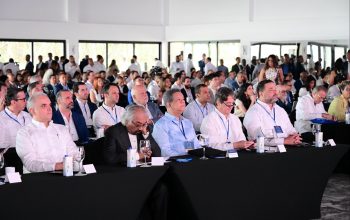news
Dominican Republic and Organization of American States (OAS) Call for Greater Central American and Caribbean (SICA-CARICOM) Integration
October 7, 2011
President Leonel Fernandez stressed the importance of Central American and Caribbean countries creating a regional body that fosters dialogue and integration in the region. He made this statement during his appearance at the forum "Economic Outlook and Challenges for Central America and the Caribbean in the Global Economy,” organized by the Global Foundation for Democracy and Development (FUNGLODE) together with the Organization of American States (OAS).
Fernandez, who is Honorary President of GFDD and FUNGLODE, explained that, in light of the uncertainty and social problems currently plaguing industrialized economies, it is crucial for Latin America and the entire Caribbean to develop a plan of action that encourages creative tourism and the commercial trade of goods and services as a way of generating
a common strategy beneficial to all.
 The debate began with the welcoming remarks by FUNGLODE’s Executive Director, Marco Herrera, who introduced the Assistant Secretary General of the OAS, Albert Ramdin. In his speech, the diplomat pointed out that it is urgent that Central American and Caribbean nations come together to face common challenges
The debate began with the welcoming remarks by FUNGLODE’s Executive Director, Marco Herrera, who introduced the Assistant Secretary General of the OAS, Albert Ramdin. In his speech, the diplomat pointed out that it is urgent that Central American and Caribbean nations come together to face common challenges
such as climate change, insecurity, drug trafficking and poverty.
José María Figueres, the former president of Costa Rica, praised President Fernandez’s proposal and added that it is vital for such integration to focus on establishing a low-carbon economy: "The future cannot be a continuation of the past, the planet is finite and its natural resources cannot continue to be exploited as has been done so far."
The Executive Secretary of the Economic Commission for Latin America and the Caribbean (ECLAC), Alicia Bárcena, emphasized that vulnerabilities should be turned into opportunities and pointed out that geographical proximity is a key element in promoting exports and thus in reducing the costs of logistics. She noted that 30% of the world’s renewable energy is produced in America, another factor that can be used to the advantage of the region.
 Bhoendradatt Tewarie, Minister of Planning and Economy of Trinidad and Tobago, furthermore highlighted the importance of Latin American countries being competitive and independent from other economies. He suggested that more resources be invested in basic, secondary and university education with a view to creating a culture of innovation that promotes young
Bhoendradatt Tewarie, Minister of Planning and Economy of Trinidad and Tobago, furthermore highlighted the importance of Latin American countries being competitive and independent from other economies. He suggested that more resources be invested in basic, secondary and university education with a view to creating a culture of innovation that promotes young
people’s creativity.
The event also featured the interventions of the Assistant Under-Secretary of State for Central America and the Caribbean, Julissa Reynoso and the Assistant Director General of the European Union, João Machado Aguilar. Both diplomats promoted Latin American and Caribbean integration and assured participants that their governments were willing to collaborate with them in the process.
The meeting was held within
the framework of the V Americas Competitiveness Forum and took place on Thursday, October 6, 2011. The forum aims to facilitate dialogue on the current economic situation, on the productivity and competitiveness of the countries of Central America and the Caribbean in light of the global economic crisis, and on finding workable solutions to shared problems.
In addition, it aims to promote business, trade and investment to foster the strengthening of economic relations in
the Latin American region in accordance with the agenda agreed upon by the Heads of State during the SICA-CARICOM summit in Salvador earlier this year.
The organizers acknowledged growing regional recognition for the fact that the strengthening of economic and investment ties between Central America and the Caribbean is absolutely essential for tackling issues of common interest, such as security, climate change, alternative energy, natural disasters, and cooperation and
coordination of foreign policy in international forums. This forum contributes to that objective by illuminating the economic potential the region and encouraging countries to take advantage of it by increasing trade, which reached US$ 754 million in 2010.
- Declaration: Business Conference “Opportunities for Business, Trade and Investment
between Central America and the Caribbean” - Remarks by Ambassador Albert R. Ramdin, Assistant Secretary General, OAS
- Agenda
- Concept Note
 |
 |






